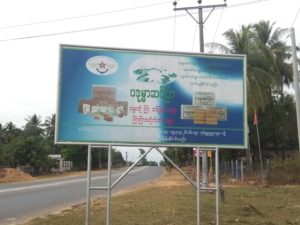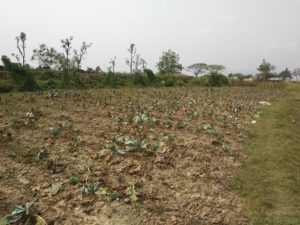Mon State government orders military-run factory to suspend operations after villagers sound the alarm on water contamination
February 28, 2019
HURFOM: Due to the actions of villagers in Ye Pyar Gone village, Paung Township, the Mon State government has ordered the Pa Don Mar soap factory, operated by the military-owned Union of Myanmar Economic Holdings Limited (UMEHL), to suspend operations as waste water from the factory has contaminated the local water supply, destroying rice and vegetable crops and placing the livelihoods of farmers in Ye Pyar Gone under threat.
 Farmers in the area have long relied on a local stream for crop irrigation, using a system of canals to redirect the water supply to their farms. However, with the disposal of waste water from the factory in to the same stream, this once rich water source has been compromised.
Farmers in the area have long relied on a local stream for crop irrigation, using a system of canals to redirect the water supply to their farms. However, with the disposal of waste water from the factory in to the same stream, this once rich water source has been compromised.
Heavy rains and flooding on January 8th 2019 are believed to have brought waste water into the system of canals throughout Ye Pyar Gone village, for in the days immediately following the flash floods, farmers reported that crops irrigated with canal water died. Typically, waste water from the factory bypasses the canals, but increased water levels enable the waste water to enter the canal system.
On January 14th 2019, farmers brought their concerns to the attention of the Ye Pyar Gone village administrator.
“We conducted a field investigation on the day we received the report from farmers. When we arrived at the farms, we saw that some vegetables had wilted, and that some were dead. We also informed the National League for Democracy (NLD) village chairperson, and local lawmaker U Tun Min Aung of what had happened. That afternoon, the lawmaker, government officials, and Dr. Min Kyi Win, the Mon State Minister of Natural Resources and Environmental Conservation, visited the farms and conducted another investigation. They also visited the factory,” said the village administrator.
Farmers in Ye Pyar Gone village alternate between growing rice during the rainy season, and vegetables during the summer months, but waste water contamination means that crops have to be replanted leading to smaller harvests, and ultimately reduced household incomes from the sale of fewer cash crops.
“The factory was built in 2002 and started to operate in 2003. Our crops have been destroyed since the factory started operation. I’ve lost at least one million kyat (US $661.85) per year. Because of these losses, my livelihood is in danger. I can’t support my children’s education and they had to drop out. In the past, we couldn’t file a report about our suffering because the factory was owned by the military. We were too afraid to complain,” said U A—, a local farmer.
“We built dykes to stop the waste water from entering our farm. But the factory staff secretly smashed the dykes at night. The stream water level rises in the rainy season, and the waste water flows into our farm. The waste water killed our rice paddies,” said U T—, a local farmer.
 As highlighted by U A—, for many years farmers did not come forward with their grievances, for not only was there no formal process to lodge a complaint against the factory, fear of punishment and reprisal from the military worked to prevent farmers from speaking out.
As highlighted by U A—, for many years farmers did not come forward with their grievances, for not only was there no formal process to lodge a complaint against the factory, fear of punishment and reprisal from the military worked to prevent farmers from speaking out.
“Now, in the era of the NLD government, we can file a complaint. We haven’t yet made a formal complaint, but we can at least speak openly about our suffering,” said U A—.
After conducting his investigation, Dr. Min Kyi Win directed factory authorities to formulate an Environmental Management Plan (EMP), and to provide the EMP to the Mon State government when completed. Factory authorities were further instructed by Dr. Win to have factory operations reviewed, to secure authorization to operate from the Mon State Environmental Conservation Department, to apply for a business license from the Central Supervisory Board of the Prevention of Hazard from Chemical and Related Substances, to systematically purify the waste water produced, and to inform local populations about factory operations and the efforts undertaken to prevent chemical hazards.
“We’ve instructed the factory to suspend operations until these steps have been taken. We also directed the factory to build a concrete waste water storage tank, and to check the percentage of chemicals in the waste water. They will have to do this regularly, and report their findings to the government,” said Dr. Min Kyi Win.
The Pa Don Mar soap factory was built in 2002 and was operated by an unknown company under the authority of the military from 2003 to 2011. In June 2017, the military-owned UMEHL re-opened the factory which has since operated two days a week, using 12,000 gallons of water per day.
It is unclear whether crops were similarly affected during the years of closure, but the combined financial losses farmers incurred from 2003 to 2011, and again since 2017, coupled with the potential long-term environmental consequences of improper waste water disposal far outweigh the temporary relief this closure may have provided.
Be it stone mining, antimony or rubber processing, monocultured cash crops, the operation of coal-powered cement plants, or soap manufacturing, the impact that industrial operations have on water resources in both Paung Township and across Mon State is severe. The continued threat that industry poses to health, property, livelihoods, and the natural environment underscores a culture of corruption and lack of rule of law in Mon state whereby the regulation of industrial activities is seldom enforced, and the rights and well-being of local populations are dismissed.
Comments
Got something to say?
You must be logged in to post a comment.



















































